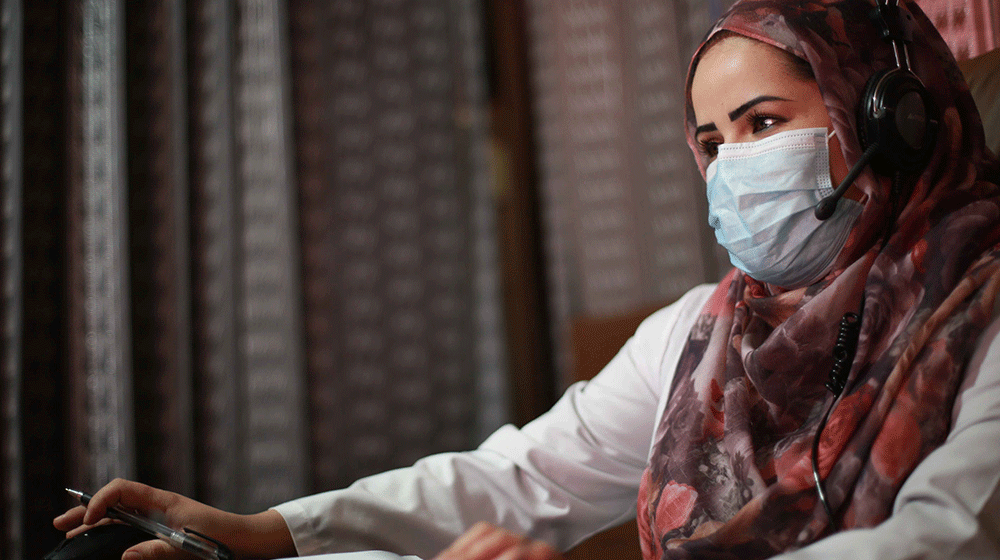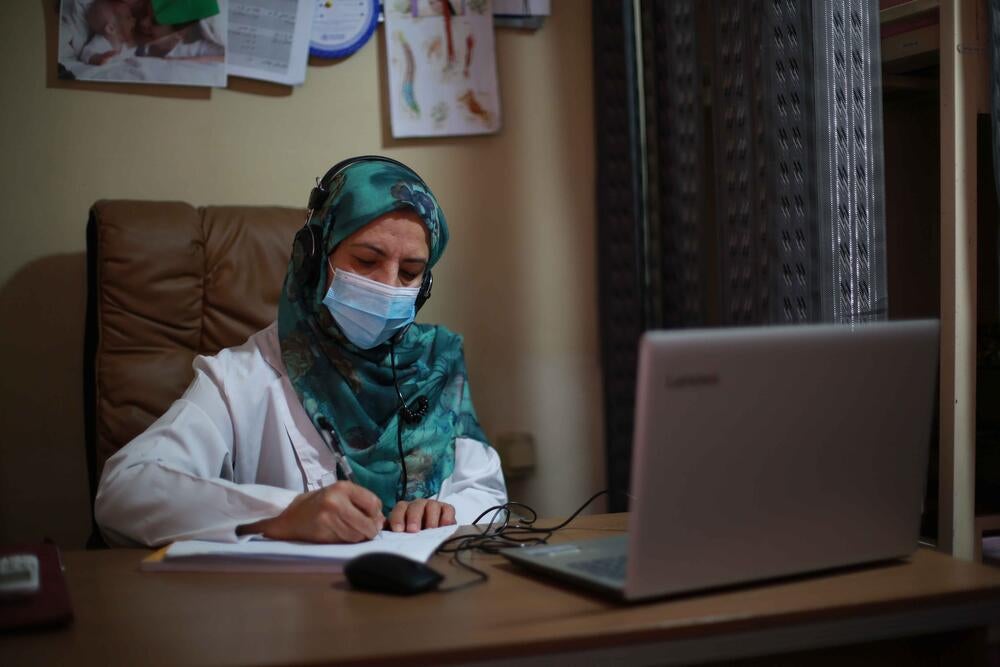Emergency help is a phone call away for midwives in Afghanistan

Kabul, AFGHANISTAN
One evening in August, Firoza, a 34-year-old mother of five, was rushed to a UNFPA family health house. She was giving birth but began to experience complications.
Family health houses help people in hard-to-reach areas access otherwise scarce maternity services. In 2021, more than 15,000 women across Afghanistan delivered their babies safely at these community clinics. The staff at the UNFPA family health house stabilized Firoza and she safely gave birth to her baby. But her midwife, Amina, noticed an issue with the delivery – it wasn’t over. Firoza had another baby on the way.
UNFPA advises midwives at family health houses not to deliver twins alone. But Firoza’s precarious condition made it too dangerous to transfer her to another facility. In any case, most other facilities had closed due to Afghanistan’s deteriorating security situation. Nervous for the well-being of her patient, Amina called the midwifery helpline for support.
UNFPA’s midwifery helpline offers remote mentoring to midwives in Afghanistan, 24 hours a day, seven days a week. Two gynecologists and two midwives staff the helpline and provide counseling, referrals, and step-by-step instructions to lead health care providers through complex, and at times life-threatening, procedures. The line receives more than 30 calls from midwives providing lifesaving care every day. Some 80 percent of these calls come from staff at UNFPA’s 172 family health houses across Afghanistan.
A call for help
The helpline staff guided Amina through the birth Firoza’s surprise second baby. But once the baby was safe, Firoza began to lose blood. She had developed a sudden, severe, and life-threatening postpartum hemorrhage.
The midwife called the helpline back, explaining Firoza’s critical condition and following advice on how to stop the bleeding. Luckily, Amina stabilized Firoza again and mom and the twins recovered. Amina closely monitored Firoza and her newborns before transferring them to the district hospital for further treatment.
“It was a difficult time for me, but I’m lucky that I was supported by the Family Health House. Now I’m feeling well and my twins are healthy,” Firoza said when she visited the facility again a week later for postnatal care.

As more and more Afghans turn to UNFPA for urgent care, the staff themselves are also in need of support. Despite colossal challenges, midwives across Afghanistan continue to work, risking their own lives to save those of women and girls.
Political upheaval in Afghanistan over the past few months has wrought havoc on the country’s economic and security situation. Many humanitarian operations have ground to a halt – including essential health services. While demand for medical supplies has soared, crippling shortages of medicine and equipment and severely understaffed facilities are leaving the lives of those who need the most critical care hanging in the balance.
Afghanistan’s health system brought to its knees
Heavily dependent on international support, the country’s health system is now teetering on the brink of collapse. If key projects lose funding, millions of Afghans would be without any health care.
Over the past two decades, the number of women dying in childbirth every year has fallen by half, thanks to major investments in the health system. But even so, Afghanistan had one of the highest maternal mortality rates in the world. Prior to the crisis, one Afghan woman was still dying from pregnancy-related complications every two hours. Now, the number of deaths will surely rise.
UNFPA Afghanistan is battling to reach thousands of women and girls with lifesaving sexual and reproductive health care and protection services. Along with family health houses, UNFPA operates 20 mobile health teams, 4 emergency clinics, and some 80 mental health clinics.
The country’s uncertain future has forced many of its health professionals to leave in search of safety and security. This “brain drain,” particularly in reproductive health services, makes support for maternal and newborn care more crucial than ever. More than 430,000 women are currently pregnant in Afghanistan. Of those women, 1 in 20 will experience complications over the next three months.